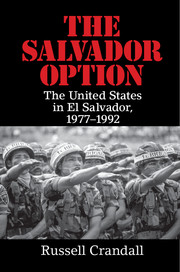Book contents
- Frontmatter
- Dedication
- Epigraph
- Contents
- List of Figures
- List of Organizations
- Acknowledgments
- 1 Introduction
- PART ONE EL SALVADOR IN THE COLD WAR
- PART TWO JIMMY CARTER
- PART THREE RONALD REAGAN
- 19 Reagan Arrives
- 20 Reagan and Salvador
- 21 El Mozote
- 22 Another Vietnam
- 23 Solidarity
- 24 Troop Cap and Certifying Human Rights
- 25 Reagan Gambles on Elections, 1982
- 26 The Shultz Doctrine
- 27 Human Rights
- 28 Henry Kissinger
- 29 Contras
- 30 “Elections Yes, Dialogue No,” 1984 Presidential Election
- 31 La Palma
- 32 Esquipulas
- 33 Counterinsurgency I
- 34 Counterinsurgency II
- 35 Zona Rosa
- 36 Air War
- 37 José Napoleón Duarte
- 38 Iran-Contra
- PART FOUR GEORGE H. W. BUSH
- PART FIVE POSTWAR
- Notes
- Bibliography
- Index
31 - La Palma
from PART THREE - RONALD REAGAN
Published online by Cambridge University Press: 05 June 2016
- Frontmatter
- Dedication
- Epigraph
- Contents
- List of Figures
- List of Organizations
- Acknowledgments
- 1 Introduction
- PART ONE EL SALVADOR IN THE COLD WAR
- PART TWO JIMMY CARTER
- PART THREE RONALD REAGAN
- 19 Reagan Arrives
- 20 Reagan and Salvador
- 21 El Mozote
- 22 Another Vietnam
- 23 Solidarity
- 24 Troop Cap and Certifying Human Rights
- 25 Reagan Gambles on Elections, 1982
- 26 The Shultz Doctrine
- 27 Human Rights
- 28 Henry Kissinger
- 29 Contras
- 30 “Elections Yes, Dialogue No,” 1984 Presidential Election
- 31 La Palma
- 32 Esquipulas
- 33 Counterinsurgency I
- 34 Counterinsurgency II
- 35 Zona Rosa
- 36 Air War
- 37 José Napoleón Duarte
- 38 Iran-Contra
- PART FOUR GEORGE H. W. BUSH
- PART FIVE POSTWAR
- Notes
- Bibliography
- Index
Summary
Whatever cross their thoughts, leaders on both sides recognized, however briefly that, as Churchill once expressed it, talk, talk, talk is better than war, war, war.
– Robert Pastor, Carter administration aide for Latin AmericaWe do not seek a military defeat for our friends. We do not seek a military stalemate. We seek victory for the forces of democracy.
– Fred C. Iklé, Under Secretary of Defense, September 1983“Auxiliary but Not Strategic Factor in Our Struggle”
Both the Salvadoran military and guerrillas believed that they could defeat each other on the battlefield outright without negotiating away core ideals. The FDR's Rubén Zamora told a foreign correspondent in 1984, “In 1981, the word ‘negotiations’ was not in our vocabulary. When you speak of negotiations, you speak of sharing. We thought before that total triumph was possible, but we have come to terms with reality.” Fundamental disagreements about what constituted “negotiations” and “power sharing” hindered any semblance of compromise or progress in these early years of the war. In late 1983, provisional president Álvaro Magaña's government appointed a peace commission that met secretly with the FMLN and FDR, but this did not result in a breakthrough. In the interim, backed by the swelling funds from Washington, the Salvadoran government bet on continued elections and strengthening the once inept fighting Salvadoran military to carry the day – as opposed to concessions at the negotiating table. U.S. officials also routinely cited ostensibly impartial observers to reinforce the fact that the guerrillas did not want peace. For example, in the summer of 1983 top diplomat Thomas Enders quoted Archbishop Arturo Rivera y Damas reflecting on the negotiations in March of that same year: “The population wants there to be peace. I do not see that the guerrillas, who have progressed militarily and in experience, have popular support.…There have been about four or five offensives and who knows how many more to come. But the people want [peace].”
It is not fully apparent what eventually led the guerrillas to the negotiating table – although first in secret – by the end of 1983. One likely factor was a change to a guerrilla leadership more amenable to talks. Under Cayetano Carpio's leadership, the FPL resisted not just negotiations with the government but even greater military and political unification of the FMLN.
- Type
- Chapter
- Information
- The Salvador OptionThe United States in El Salvador, 1977–1992, pp. 331 - 339Publisher: Cambridge University PressPrint publication year: 2016



